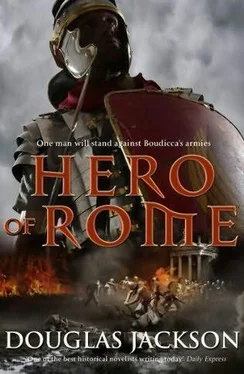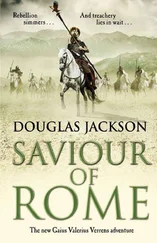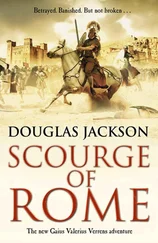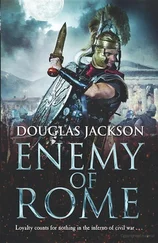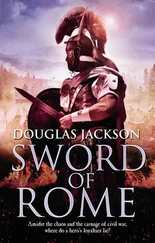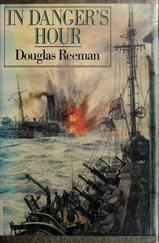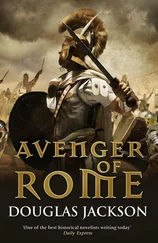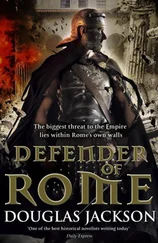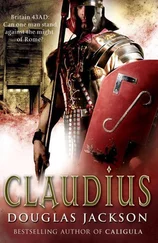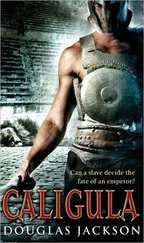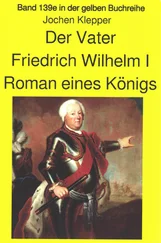Douglas Jackson - Hero of Rome
Здесь есть возможность читать онлайн «Douglas Jackson - Hero of Rome» весь текст электронной книги совершенно бесплатно (целиком полную версию без сокращений). В некоторых случаях можно слушать аудио, скачать через торрент в формате fb2 и присутствует краткое содержание. Жанр: Исторические приключения, на английском языке. Описание произведения, (предисловие) а так же отзывы посетителей доступны на портале библиотеки ЛибКат.
- Название:Hero of Rome
- Автор:
- Жанр:
- Год:неизвестен
- ISBN:нет данных
- Рейтинг книги:5 / 5. Голосов: 1
-
Избранное:Добавить в избранное
- Отзывы:
-
Ваша оценка:
- 100
- 1
- 2
- 3
- 4
- 5
Hero of Rome: краткое содержание, описание и аннотация
Предлагаем к чтению аннотацию, описание, краткое содержание или предисловие (зависит от того, что написал сам автор книги «Hero of Rome»). Если вы не нашли необходимую информацию о книге — напишите в комментариях, мы постараемся отыскать её.
Hero of Rome — читать онлайн бесплатно полную книгу (весь текст) целиком
Ниже представлен текст книги, разбитый по страницам. Система сохранения места последней прочитанной страницы, позволяет с удобством читать онлайн бесплатно книгу «Hero of Rome», без необходимости каждый раз заново искать на чём Вы остановились. Поставьте закладку, и сможете в любой момент перейти на страницу, на которой закончили чтение.
Интервал:
Закладка:
He searched the dead men for personal identification or some weapon to give him at least a chance of fighting back against any wandering band of rebels he encountered, but he found nothing. When he was certain, he swung himself painfully into the saddle and retraced the legion’s tracks towards the north.
Where the forces of retribution gathered.
XL
The cavalry patrol found him just as the sun reached its highest point and they would have killed him if he hadn’t had the presence of mind to cry out the name of his unit as they approached at the gallop, their long spatha swords gleaming and their eyes bright and nervous. The decurion in command circled him warily before, in a thick Germanic accent, ordering him to dismount.
Valerius shook his head wearily. ‘I have urgent news for whoever is the senior commander in this area. Take me to see him at once.’
‘On whose authority?’ the German demanded.
Valerius shook off his cloak and heard the exclamations of dismay at the sight of his wounds. ‘I need no authority but my own. I am tribune Gaius Valerius Verrens, last commander of Colonia, only survivor of the Temple of Claudius, and you will take me or I will go alone. Who commands?’
The cavalryman hesitated. ‘Suetonius Paulinus, with the Fourteenth and the Twentieth.’
‘Then take me to the governor, but first give me a drink,’ Valerius said. ‘I have had nothing but some druid’s piss since dawn.’
By the time they reached the main column the legions had settled into their marching camp for the night and it took a few minutes before they tracked down Paulinus’s pavilion at the heart of the Fourteenth’s entrenchments. Valerius noticed a number of men with freshly bandaged wounds. So, they hadn’t had it all their own way on Mona; Lunaris had been right about that, at least. The camp of the Twentieth was considerably smaller than that of the Fourteenth, which told him Paulinus had left part of the legion in the west to consolidate whatever gains he’d achieved. Would he have made that decision if he’d been aware of the scale of the rebellion?
The German cavalryman handed him over to a senior tribune on Paulinus’s staff, an officer Valerius vaguely recognized. ‘Gnaeus Julius Agricola, at your service. The governor wishes to see you immediately, but…’
Valerius swayed on his feet and struggled to keep the resentment from his tone. ‘I’m sorry, I left my uniform at Colonia along with everything else.’
‘No, you mistake me. Please do not apologize,’ Agricola protested. ‘It’s just that I fear you might fall down and I would be in trouble if I lost you now. The governor has grave need of you.’
The tribune ushered him past the guards to Paulinus, who was staring as if hypnotized at a map of southern Britain pinned to a wooden frame. A second man in a legate’s sculpted bronze cuirass stood beside him. Eventually, the governor turned and even through his exhaustion Valerius registered the change in the man. The granite-chip eyes were sunk deep, the heavy brow was furrowed and his skin had taken on a sickly grey pallor emphasized by white stubble that made him look ten years older. Paulinus stared back at him, equally perplexed, his mind clearly attempting to put a name to the unkempt figure in the ragged Celtic clothing and bloody bandages. Valerius could hardly blame him; after all, he would remember a whole young man in the prime of youth, not a haggard spectre with only one hand.
It had been the price of his life.
‘You will never bear arms against my people again,’ Maeve had said before Cearan raised the sword and removed the right hand with a single clean stroke midway between elbow and wrist. They had used hot pitch to stem the bleeding, but Valerius remembered nothing bar the smell of roasting flesh and the vague knowledge he was no longer whole. During the ride north, the maggots breeding in his mind had been as corrosive as the wounds in his flesh. At first, he wished he’d died along with the rest. What use was a part-man? His soldiering was finished. He could no longer hold a sword or add his weight to a shield wall. Of course, his father would support him, but in his heart he would be little different from the cripples begging hopefully along the Clivus Argentarius. The last stand of the Ninth had rekindled his pride and restored his sanity. The standard-bearers could have run but they had fought, driven by duty and honour and courage, the code they shared with Falco’s veterans. If they had suffered death for those values, could he not suffer a life?
Paulinus’s reaction surprised him. ‘My boy. My poor, dear boy. It is you. I could scarce believe it. You have endured so much. Could any man have sacrificed more for Rome?’
Valerius thought of the six thousand and more who had sacrificed everything for Rome, but the time to remind the governor of that would come later. Paulinus was clearly a man living on the dagger’s edge and the slightest push could throw him off balance.
But some things could not be avoided. ‘Tribune Gaius Valerius Verrens begs to report the loss of Colonia and the failure of his mission,’ he said formally. ‘He would commend to you the conduct and leadership of the veteran militia, which was in the highest tradition of Roman arms. They fought to the last man and the last spear, and no blame should attach to them for the city’s fall. If blame there is, it is mine.’
‘Yet you delayed them for two days, and defended the Temple of Claudius to the end.’ The second man combined natural authority with a hangdog expression and he grasped at the positive like a drowning man clutching at the last branch before a waterfall.
‘I had the privilege to command the defence,’ Valerius admitted. ‘No men could have done more.’ Memories of Lunaris and Messor flooded back and he staggered slightly as a wave of nausea flooded through him.
‘A chair for the tribune, quickly, and water,’ Paulinus called to one of his aides. Valerius sat and the governor stared at him intently.
‘Cerialis is correct,’ he said. The name confirmed Valerius’s suspicion and explained the air of defeat which cloaked the other man. Quintus Petilius Cerialis commanded the Ninth legion and was ultimately responsible for the massacre Valerius had stumbled upon. It also answered his question about the eagle. If the Ninth had lost its eagle Cerialis would be dead; Paulinus would have insisted. The governor’s voice regained some of its old fire as he continued. ‘Since I took Mona we have experienced betrayal, disaster and defeat, thanks to that fool Catus Decianus whose greed and ambition placed this province in deadly peril and sent you, Valerius, into the very gates of Hades. Colonia, at least, was a defeat with honour, as has been confirmed by our spies and the Celts who are already deserting to us. The praises of its defenders are sung even by the followers of the rebel queen, and the defence of the temple, which they desired most eagerly to overthrow, sung loudest of all. And you, you alone, fought your way clear.’ Valerius opened his mouth to deny it but Paulinus raised a hand for silence. ‘You are a true Hero of Rome.’
It took time to penetrate, but when it did Valerius felt the room spinning around him. The way Paulinus said the words, with the emphasis on ‘Hero’, indicated this was more than praise, it was eternal fame. A Hero of Rome would receive the Corona Aurea, the Gold Crown of Valour, from the Emperor’s own hands. He would be feted throughout the Empire, and have access to the centre of power. It was second only to the Corona Graminea, awarded for saving an entire legion… and he did not deserve it. He shook his head, but Paulinus was already continuing. ‘Now, I must know everything.’
For the next hour Valerius related the story of the veterans’ stand against Boudicca’s fifty thousand and the final, terrible hours of the Temple of Claudius. Paulinus grunted in approval at the use of the bridge to draw the British champions on to the killing ground and his eyes grew moist when he heard of Messor’s courage and sacrifice. But when Valerius tried to describe his own escape he was dismissive. ‘I do not need the details. It is enough that you have survived.’
Читать дальшеИнтервал:
Закладка:
Похожие книги на «Hero of Rome»
Представляем Вашему вниманию похожие книги на «Hero of Rome» списком для выбора. Мы отобрали схожую по названию и смыслу литературу в надежде предоставить читателям больше вариантов отыскать новые, интересные, ещё непрочитанные произведения.
Обсуждение, отзывы о книге «Hero of Rome» и просто собственные мнения читателей. Оставьте ваши комментарии, напишите, что Вы думаете о произведении, его смысле или главных героях. Укажите что конкретно понравилось, а что нет, и почему Вы так считаете.
